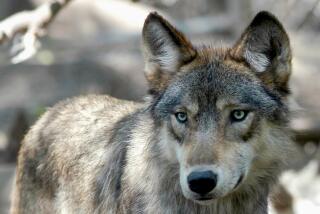Wolves kill teacher in Alaska
- Share via
Reporting from Seattle — Hunters were combing the snowy brush around Chignik Lake, Alaska, on Friday in an attempt to hunt down up to four wolves that killed a 32-year-old special education teacher in the first known fatal wolf attack in the U.S. in modern times.
But the wolves were elusive, and villagers were hoping that state game officials would send in a helicopter to help track the animals, Village Council President Johnny Lind said.
“They’ve been looking and scouting around, and the wolves are definitely still around, but they’re smart, and they take off before you can get close to them,” Lind said.
Candice Berner, a special education teacher who traveled among several rural schools on the Alaska Peninsula, 475 miles southwest of Anchorage, was attacked while jogging and listening to her iPod Monday evening on the deserted, 3-mile-long road that leads out from the village to its small airstrip.
A native of Slippery Rock, Pa., she had been working in Alaska only since August. Her body was found by snowmobilers a short time after the attack. It had been dragged off the road and partially eaten, and was surrounded by wolf prints.
“Our investigation points to wolves being the most likely culprit. It is the only predatory animal that is active in the area that we’re aware of, and we also believe the wolves have been increasingly threatening to people in the area,” said Megan Peters, spokeswoman for the Alaska State Troopers. “They’ve been getting too close, circling, making people fearful for their safety.”
Christi Aleck, another resident of the village, said that while there are always wolves in the area, three to four have been lingering unusually close over the past week or so and have been sighted again since the attack.
“They come in at nighttime, not very far from the village, and they’re just kind of watching,” she said. “They’re waiting for somebody else to go out again, I guess.”
She said villagers are driving their children to school and keeping them indoors during recess.
“People are scared. Oh yeah, they’re scared,” she said. “Nobody’s walking around anywhere. I mean, wolves have always hung around in the wintertime, but they’ve never attacked anyone.”
The only known previous fatal wolf attack in North America over the last 100 years occurred in 2005, when a young geology student was attacked and partially eaten by a pack of wolves in northern Saskatchewan.
In at least two other cases, there were attacks -- in Alaska and again in Saskatchewan -- that were halted by rescuers before they became fatal.
“What the research shows is that in the last 10 or 20 years, as wolves have kind of re-colonized areas where they were extirpated around the turn of the 20th century, and as people have also developed more habits of going out into national parks and wilderness areas, we’ve had more aggressive encounters,” said Mark McNay, a retired Alaskan wildlife biologist who has studied wolf attacks.
Wildlife attacks in Alaska are relatively common. “Certainly we have bear maulings, we have people bitten by wolves, we have people that are stomped by moose,” Peters said. “Having an incident where a human and animal cross paths and it doesn’t end well, that’s normal. But we don’t have any other case on hand that we’re aware of where someone was actually killed by a wolf.”
Peters said state troopers had ruled out the possibility that Berner had died from any other cause and was later dragged away by wolves.
More to Read
Sign up for Essential California
The most important California stories and recommendations in your inbox every morning.
You may occasionally receive promotional content from the Los Angeles Times.










